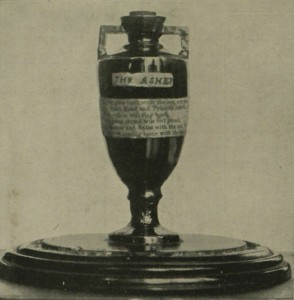Broadside brings blood at the Gabbatoir
Thursday, November 21st, 2013Well, it was bound to happen, wasn’t it? Speak of the devil, and he appears. Call Stuart Broad a “27-year-old medium pacer” and he takes five wickets.
Tempting fate? Best not to. Schadenfreude? Perhaps just a smidgen. Childish the Courier-Mail’s antics may have been – in a “let’s just ignore him but devote a full front page to him” kind of way, but it was pretty amusing, and to be fair Broad, with his at-times pompous air of self-importance, brings a lot of it on himself (his scathing passing of judgement back in the summer on what constituted “a true England fan” when someone on Twitter dared criticise England’s soporific batting was especially irritating).
But the man can bowl, and yesterday took five wickets quicker than you can say “the Aussies will be a much tougher prospect at home”. That prediction could yet turn out to be true – bitter experience has taught never to assume anything until England have batted – but the Australian batting had the same jerry-built, threadbare feel to it that it had back in England, despite all of Michael Clarke’s bullish talk of a more settled team, a team that picked itself, lessons learned, and all the stuff you’re supposed to say when fronting up to your country’s media on the back of nine Tests without a win.
The wickets of Chris Rogers and Shane Watson bookended the morning session, with the latter likely proving the most disastrous to Australia’s search for a respectable total on an excellent batting wicket, but it was the scalp of Michael Clarke that should worry the home-side the most – all of that work in the nets, practising against the short ball, only to have Broad fire one into his ribs: the Australian captain fended it to short-leg with all the spinal flexibility of a brick smokestack. The wickets of Dave Warner and Mitchell Johnson rounded out Broad’s five; when he’s on a roll – whether on Twitter or the field of play – there is no stopping him.
England’s other bowlers acquitted themselves well, too. A muscle-bound Chris Tremlett, resembling another structure also made of brick, was preferred to Steven Finn for the role of third seamer, and while he has a way yet to go to recall the glory days of 2010-11 after a long injury layoff, he too bowled with conviction and control and was rewarded with the wicket of a potentially destructive Steve Smith. Jimmy Anderson, in his usual default mode of menacing accuracy, deserved more than two wickets.
So far, it’s like Australia never left England. The problems they had there are still in evidence. That they’re having them at a ground where they were expected to prosper – the last time Australia lost here was twenty-five years ago – is even more sobering.
Given that being a target for derision in the Aussie press seems to act as some kind of reverse jinx (see also the media’s reaction to Michael Clarke being made captain in 2010) Kevin Pietersen must now be licking his lips as he contemplates batting on the second day, given he too has been a target for similar nonsense in the papers before they decided to turn their attention to Broad.
Thursday, though, belonged to the Man With No Name. The wicket was good, the batting (Haddin and Johnson’s partnership of 114 aside) was bad, and right now the chances of the home side turning the tables on the Poms look downright ugly.
